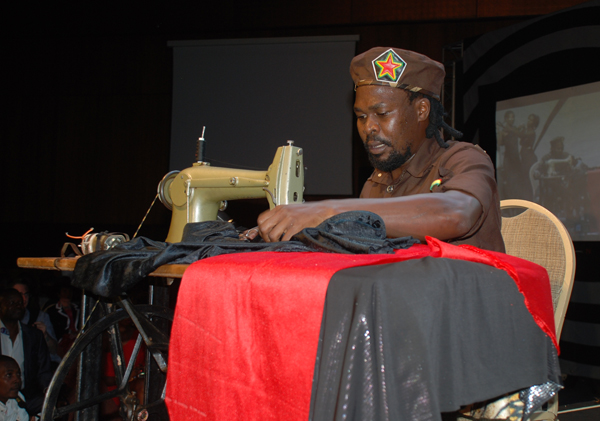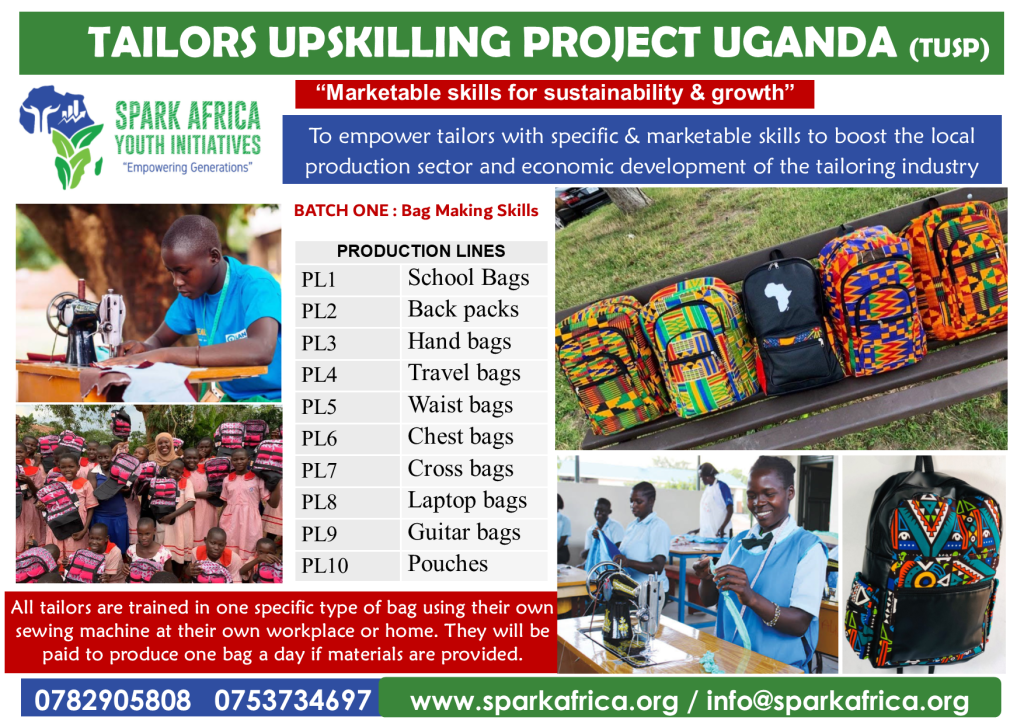TAILORING AS A VOCATION IS NOT THE PROBLEM, THE MINDSET IS
Thousands of tailors across Uganda are graduated every year and many initiatives have come up to embrace tailoring as a crucial vocation to venture in and this has given a lot of hope to the youth and women in Uganda. But as always because of a mindset that has been fed in us through the education systems of not owning our own resources with passion and hard work but rather accepting that we are inferior and are okay with mediocracy. If you don’t understand how this is all connected, ask yourself why is 99% of all the clothes and bags we use are not manufactured in Uganda yet we export cotton and we have Ugandan designers that can make these products exported from china.

THIS IS CLEAR THAT THE SKILL IS NOT THE PROBLEM, THE MINDSET OF THE TAILORS IN UGANDA IS. THEY ARE STUCK TO THE TRADITIONAL TECHNIQUES OF THE INDUSTRY THATS WHY THEIR CHILDREN ARE STILL PUTTING ON CLOTHES PRODUCED BY CHINESE. AND WE HAVE NO PRODUCTION SYSTEMS CONTROLLED BY LOCAL UGANNDAN TAILORS.
ANYWAY! THATS A STORY FOR ANOTHER DAY.
WHAT IS THE BIG QUESTION?
The Big question is where are these tailors now, how relevant are they to the local production sector and the economy at large?
First of all, lets begin with asking ourself a question, what are these tailors being taught where they learn the skill from? because the cause of lack of impact and relevancy as tailors in Uganda begins from there. Once we have tailors that are so packed with irrelevant knowledge, then they can never be relevant with the changing world today. As a tailor I have understood that most of the training modules developed in the curriculum are those that we very well know we cant compete on a large scale. like clothes for example. The other important issue about the curriculum is that its not market based or demand driven, it focuses on the modules that have been passed on from the previous years.
But the designers of these modules forget that times are changing, trends come and go, and that tailoring is an art, it describes the dynamics of fashion and design.
HOW DO WE OVERCOME THIS?
Clearly the drama in our leaders is exceptional, no one is willing to take the risk of changing a curriculum, but that doesn’t mean that we cant do anything about it. all we have to do is collectively empower the local Ugandan tailors and create systems that can make them own the value chain of their industry.
The knowledge passed on to these tailors must be relevant to the current market needs starting with our Ugandan fashion trends. This is only possible for the existing tailors through up skilling programs to enhance their skills directing them to the market needs and emphasizing specialization in single product rather than knowing many but being a master at none.
NOW WE CAN ALL SEE THE NEED FOR UPSKILLING PROGRAMS AMONG UGANDAN TAILORS ; BECAUSE THEY HAVE BEEN FED A WRONG MINDSET ABOUT THEIR SKILL AND HAVE NOT BEEN TAUGHT HOW TO MARKET THEMSELVES
The relevancy of these skills passed on is based on the market demands & target market, so if our curriculum of training a tailor is not market based then the tailor ceases to be in business. We have all known tailoring as making clothes but we are still importing clothes, so it’s more of an art with dynamics not a static traditional skill.
This is why as SPARK AFRICA INITIATIVES, we are focusing on creating a solution within ourselves through the TUSP (TAILORS UP SKILLING PROJECT UGANDA); by empowering tailors with advanced and specific skills to be able to work together to form a sustainable production eco system in specific market based production lines like school bags, craft shoes, safari bags, laptop bags etc.

Collectively if each tailor can produce one bag every day, we could create a sustainable tailor’s eco system controlled by local Ugandan tailors hence being relevant in the local production sector.
Tailors are trained a specific type of bag using their own sewing machine at their own workplace or home. Each group of tailors will be assigned a production supervisor according to area of expertise and interest. They will dedicate to produce one bag a day if materials are provided. As they start production with the teams, they are paid a percentage of their labor and are also used as agents to train other tailors in their homes and workplaces. With this done repetitively, we could generate a reasonable income through satisfying the local bags market in Uganda where we no longer import basic personal bags and then we can also think of the international market.
With this we shall also change the people’s mindset about their perspective on tailoring.
We believe the solutions Ugandans are looking for can only be created from within themselves if guided well and fed the relevant skills and knowledge.
FOR GOD AND MY COUNTRY
COMPILED BY: AHIMBISIBWE BRANTON
FOR MORE INFORMATION ABOUT OUR BAG MAKING E BOOKS AND OUR UPSKILLING PROGRAMS
CALL 0782905808 0753734697 OR EMAIL: info@sparkafrica.org


Leave a Reply